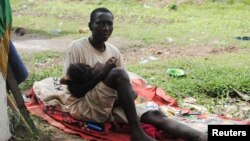The Ebola crisis in West Africa is high on the agenda of this year’s African Union summit in Addis Ababa. Although there are increasing signs the outbreak is in decline, African leaders remain focused on recovery efforts and erasing the stigma the virus has left on the continent.
Just walking in the front door of the African Union building is a blunt reminder that Ebola is on everyone’s minds.
Ahead of the metal detectors, health workers point thermometers at the heads of visiting delegates, observers and journalists, monitoring for fever. Signs displayed throughout the well-polished corridors read “Ebola is Real.”
AU assembly members are due to discuss two reports related to the Ebola crisis during the summit.
AU Commission Deputy Chairperson Erastus Mwencha told reporters the outbreak seemed to be waning, but regional leaders wanted to be prepared for the next possible health crisis.
“As lessons learned, part of our resolve is to put in place a mechanism for us to be prepared that when there is such an outbreak we are ready to move quickly, and one of the discussion that is taking place at this summit is the need for us to have a center for disease control,” said Mwencha.
The World Health Organization said this month Ebola cases have declined sharply in Guinea, Liberia and Sierra Leone, the countries hardest hit by the outbreak, but warned nations to remain vigilant.
Mwencha said affected countries paid economic and social costs as fear about the crisis drove down travel to and exports from the Ebola region.
“There was the stigma part of it, which was a major challenge. There was some kind of embargo associated with this stigma, because flights stopped going there, borders were closed and those countries faced problems,” said the deputy chairperson.
While African nations have pledged millions of dollars to aid the response and recovery to the Ebola crisis, an anti-poverty group called the ONE Campaign said many have yet to actually provide the money.
Speaking on the sidelines of the summit, ONE Campaign Executive Director Sipho Moyo said the group was calling on African leaders to step up their assistance.
“There remains a serious gap between the monies that have been pledged and the monies that have been delivered. To date, probably less than a handful of countries have probably met their commitments,” said Moyo.
Moyo said countries including Ivory Coast, Kenya, Namibia and Nigeria have all pledged money, but have so far failed to deliver.
AU Summit to Discuss Lessons, Stigma of Ebola
- By Gabe Joselow

ADDIS ABABA, ETHIOPIA —








